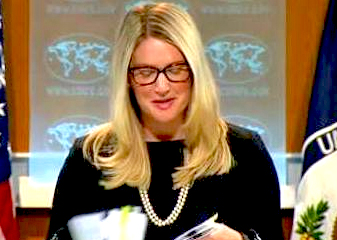 Washington, May 10: As India enters the last lap of its crucial parliamentary poll, the US has signalled that it will work closely with whoever emerges as the prime minister from India's "incredible national elections."
Washington, May 10: As India enters the last lap of its crucial parliamentary poll, the US has signalled that it will work closely with whoever emerges as the prime minister from India's "incredible national elections."
"We will work very closely with whoever is the next prime minister of India, I can guarantee you that," State Department Spokesperson Marie Harf told foreign media.
"I'm sure we will have meetings here," she said when asked if Bharatiya Janata Party leader Narendra Modi would be invited to US if he becomes prime minister.
I just don't have anything to preview for - we're going to have to wait and see what the results are of the election," she added without saying how the US planned to address the Modi visa issue. The US had revoked Modi's business visa in 2005 for his alleged role or inaction during the 2002 Gujarat riots.
However, after shunning Modi for nearly nine years, US ambassador Nancy Powell met him in February signalling a major change in US policy.
"Obviously, we look forward to continuing to work with India on a whole range of issues with whoever is in the next Indian government, whoever ends up being a part of that government," Harf said while declining to "comment on sort of internal Indian politics."
Asked about the issues the US would like to work on with the new Indian government, the spokesperson put business and people-to-people ties on the top.
Noting that India-US "bilateral trade has grown to nearly $100 billion and there's more room to keep growing," Harf said: "That helps not just India but also Americans, American businesses, American workers here at home." "So that's certainly one place we want to continue to work together. "Another is on people-to-people ties.
"We have something like 113,000 Indian students studying in the US just this year, which I think is second only to China."
"So certainly at the people-to-people level, we think there is great room to keep working together, again, which benefits both of our countries," Harf said.
"On all of these issues we're going to keep working together, whoever the winner ends up being. So we will continue watching the process and we will wait and see," she added.
Asked about BJP's reference to changing India's nuclear policy in its manifesto, Hasrf said: "Well, I think what we're doing right now is waiting to see the outcome of the election and to see what the government looks like.
"And we'll work with whoever it is, and we'll talk on the whole range of issues we always talk about, and I think we'll take issues as they come then. I don't want to get ahead of the process of the election."






Comments
Add new comment